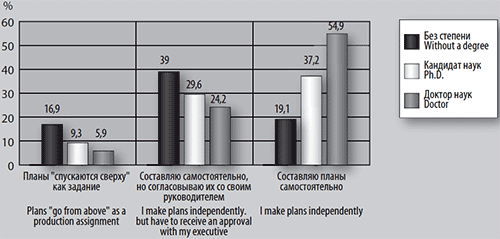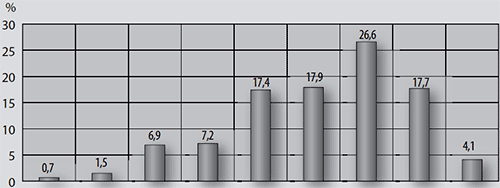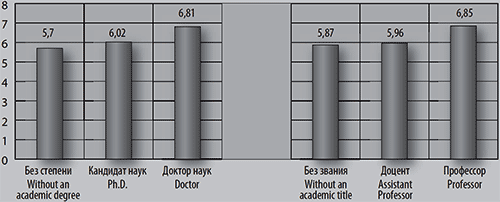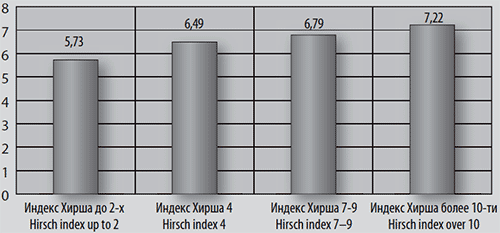Article
Sobkin V.S., Andreeva A.I., Rzaeva F.R. (2017). Professional activity of the researcher in the field of education: features of planning, resources for implementation, satisfaction with the results. National Psychological Journal. 4, 5-16.
Abstract
Background. The paper examines the attitude of scientists engaged in research in the field of education to various aspects of professional activity: the features of planning, resources for implementation, and satisfaction with the results. The relevance of the study is due to a number of institutional changes in the national science. Thus, the active reform initiated in 2013 was aimed at optimizing and increasing the efficiency of various research institutes, primarily those within the structure of state academies. In this regard, it seems important to identify the scientists’ attitude to the results of the implemented initiatives within the period of the last four years.
Objective. The paper is to analyze the influence of age and social indicators of professional status (academic degree, academic title, position held, publication activity) on various aspects of the professional activity of the researches.
Design and sample characteristics. A special questionnaire of 72 questions was developed (closed, open and scale), 721 respondents were interviewed. The sample included employees with different levels of scientific qualifications and length of professional scientific activity. Both employees of scientific research institutes and universities from different regions of the Russian Federation were interviewed.
Results. The results show the manifestation of negative tendencies concerning the planning of scientific activity related to its authoritarian nature and formal requirements for reporting on the results of scientific activity. The peculiarities of well-being of scientific employees at the stage of completing a professional career are revealed. The features of the manifestation of the professional crisis, which is characteristic for the age cohort of forty-year scientific workers, are considered. The specifics of attracting personal funds and additional financial sources depending on various indicators of the professional status of the scientist are shown.
Accepted: 09/26/2017
Pages: 5-16
DOI: 10.11621/npj.2017.0401
PDF: Download
Keywords: researcher; education; scientific activity; planning; work satisfactions; organizational and financial resources; questionnaire survey; social and professional status;
Available Online 01.01.2018
Table 1. Answers of researchers of different age cohorts relative to the planning features of their professional activities (per cent)
|
Age |
Under 30 y o |
31-40 y o |
41-50 y o |
51-60 y o |
over 60 y o |
|
I make plans independently |
21.6 |
35.8 |
37.2 |
38.9 |
60.6 |
|
I make plans independently. but have to receive an approval with my executive |
32.8 |
39.4 |
25.6 |
33.1 |
17.0 |
|
I make plans with the executive and colleagues |
36.6 |
22.4 |
36.6 |
26.8 |
23.40 |
|
Plans "go from above" as a production assignment |
20.9 |
6.7 |
11.0 |
6.4 |
7.40 |
|
Other |
1.5 |
7.3 |
1.8 |
2.5 |
0.00 |

Fig. 1. Independence of professional activity planning depending on the degree of the employee (per cent)
Table 2. The attitude of researchers to the ratio between planning and reporting forms in organizing their scientific activities (per cent)
|
Option |
% |
|
Yes, but often I have to make adjustments to the plan and skip the plan |
29.8 |
|
Yes, it helps to effectively organize the work in accordance with the main goals |
29.7 |
|
No, the plan is a formal note |
28.5 |
|
Yes, but for me it's important to fix only the final result. and not to plan the process itself |
10.1 |
|
other |
1.9 |
Table 3. Responses of researchers to the question of preparing a text for publication in a foreign language (per cent)
|
I write (translate) the text myself |
36.8 |
|
I ask colleagues for help |
28.2 |
|
In the organization where I work there are no in-house translators |
2.9 |
|
I pay translator fees using my own budget |
21.7 |
|
the organization where I work covers translator fees |
1.8 |
|
I don’t publish works in foreign languages |
24.1 |
|
other |
1.7 |

Fig. 2. The importance of resources ensuring participation of employees in scientific conferences (per cent)

Fig. 3. Scores of researchers relative to the level of satisfaction with the results of their scientific activity (%)

Fig. 4. Average scores on the scale of «satisfaction with the results of scientific activity». depending on the availability of the academic degree and the academic title (scores)

Fig. 5. Satisfaction with the results of scientific activity» depending on the publication index (scores)
References:
Bornmann, L., & Daniel, H.D. (2005) Does the h-index for ranking of scientists really work? Scientometrics, 65(3), 391–392. doi: 10.1007/s11192-005- 0281-4
Bureaucracy strangles science. [Rossiyskaya akademiya nauk]. Retrieved from: http://www.ras.ru/news/shownews.aspx?id=48374dac-45c1-4a45-80cf-dbb402c58777 (accessed: April 20, 2017)
Bureaucracy to science is contraindicated. [Nauka i tehnologii RF]. Retrieved from: http://strf.ru/material.aspx?CatalogId=221&d_no=58802#.WUpAMEhSDcs (accessed: April 17, 2017).
Coryn, C.L. (2007) The use and abuse of citations as indicators of research quality. Journal of MultiDisciplinary Evaluation, 3(4), 115–121.
Erikson, E.H. (1993) Childhood and society. WW Norton & Company.
Erikson, E.H. (1994) Identity and the life cycle. WW Norton & Company.
Erikson, E.H. (1956) The problem of ego identity. Journal of the American Psychoanalytic Association, 4(1), 56–121. doi: 10.1177/000306515600400104
Federal Law as of September 27, 2013 # 253-FZ «On the Russian Academy of Sciences, the reorganization of state academies of science and the introduction of changes in certain legislative acts of the Russian Federation». Retrieved form: https://rg.ru/2013/09/27/ran-site-dok.html (accessed: 04/10/2017).
Federal Law # 94 on public procurement in its application to the scientific field. Retrieved form: http://www.consultant.ru/document/cons_doc_LAW_54598/accessed:04/10/2017).
Fortov, V. «Bureaucracy is a cancer of our science». [Komsomolskaya Pravda]. Retrieved from: http://www.kp.ru/daily/25824/2801778/ (accessed: 04/10/2017)
Gokhberg, L.M., Kitova, G.A., Kuznetsova, T.E., & Shuvalova О.R. (2010) Russian scientists: strokes to the sociological portrait. Moscow, GU-HSE, 140.
Graham, L.R. (Ed.) (1990) Science and the Soviet social order (2). Cambridge, MA. Harvard University Press. doi: 10.4159/harvard.9780674592568
Ikonnikov, O.A. (1993) Emigration of scientific personnel from Russia. M: Compass, 104.
Kornhauser, W. (1982) Scientists in industry: Conflict and accommodation. Greenwood Pub Group.
Kubie, L.S. (1953) Some unsolved problems of the scientific career. American Scientist. 41(4), 596–613.
Mirskaya, E.Z. (1995). Russian academic science today: Its societal standing and the situation within the scientific community. Social studies of science, 25(4), 705–725. doi: 10.1177/030631295025004006
Rabkin, Y.M., & Mirskaya, E.Z. (1993) Science and scientists in the post-Soviet disunion. Social Science Information, 32(4), 553–579. doi: 10.1177/053901893032004002
Remuneration of scientific employees labour and heads of federal institutions subordinate to the federal agency of scientific organizations. [Federal’noe agentstvo nauchnykh organizatsiy]. Retrieved from: http://fano.gov.ru/en/documents/card/?id_4=66135 (accessed: April 20, 2017)
Roach, M., & Sauermann, H. (2010) A taste for science? PhD scientists’ academic orientation and self-selection into research careers in industry. Research Policy, 39(3), 422–434. doi: 10.1016/j.respol.2010.01.004
Shauman, K.A., & Xie, Y. (1996) Geographic mobility of scientists: Sex differences and family constraints. Demography, 33(4), 455–468. doi: 10.2307/2061780
Schibeci, R.A. (1986) Images of science and scientists and science education. Science Education. 70(2), 139–149. doi: 10.1002/sce.3730700208
Sobkin, V.S., & Adamchuk, D.V. (2016) Modern teacher: life and professional orientation. Works on the Sociology of Education, Vol. XVIII, Issue XXX. Moscow, FGBIU «IUO RAO», 216.
Sobkin, V.S., & Tkachenko, O.V. (2007) A student of a teacher-training university: vital and professional perspectives. Works on the Sociology of Education. Vol. XI-XII. Issue. XXI. Moscow, Tsentr Sotsiologii obrazovaniya, RAO, 200.
Sobkin, V.S., Andreeva, A.I. & Rzaeva, F.R. (2017) On the vital values of researchers in the field of education. National Psychological Journal, 2, 106–115. doi: 10.11621/npj.2017.0212
Sobkin, V.S., Andreeva, A.I. & Rzaeva, F.R. (2017) Researcher: attitude to the reform of Russian science in the field of education (based on the sociological survey). [Obrazovatel’naya Politika], 1, 13–23.
Sobkin, V.S., Andreeva, A.I. & Rzaeva, F.R. (2017) Professional mobility of researchers in the field of education. Pedagogika, 1, 42–57.
Sorenson, O., & Fleming, L. (2004) Science and the diffusion of knowledge. Research policy, 33(10), 1615–1634. doi: 10.1016/j.respol.2004.09.008
Stein, M. (Ed.). (1995) Jungian analysis. Open Court Pub Co.
The bill on reforming the RAS adopted in the first reading. Garant.ru. Retrieved from: http://www.garant.ru/news/481883/ (accessed: April 20, 2017).
Yurevich A.V. Clever, but poor: scientists in modern Russia. [Moskovskiy obshchestvenno-nauchyy fond]. «Scientific Reports» Series, Vol. 70. Moscow, 201.
For citing this article:
Sobkin V.S., Andreeva A.I., Rzaeva F.R. (2017). Professional activity of the researcher in the field of education: features of planning, resources for implementation, satisfaction with the results. National Psychological Journal. 4, 5-16.


